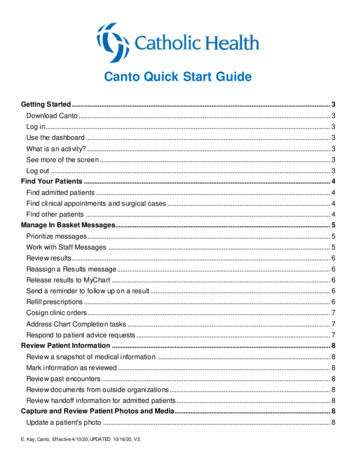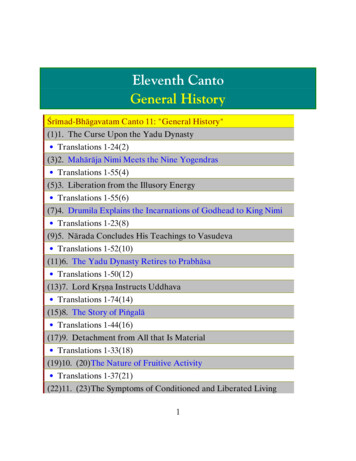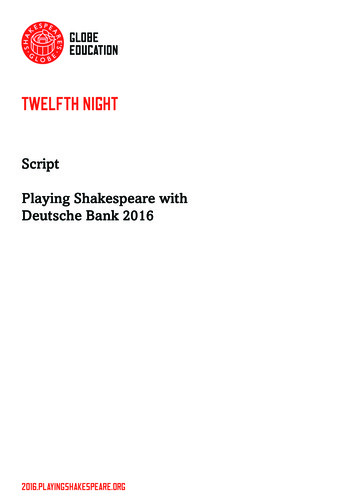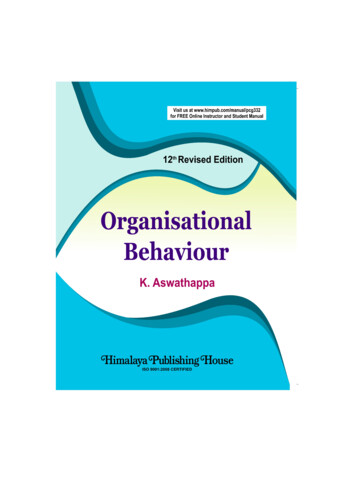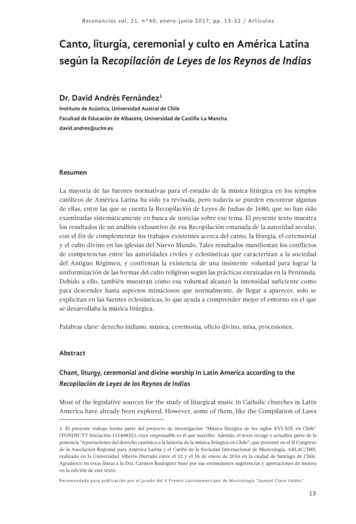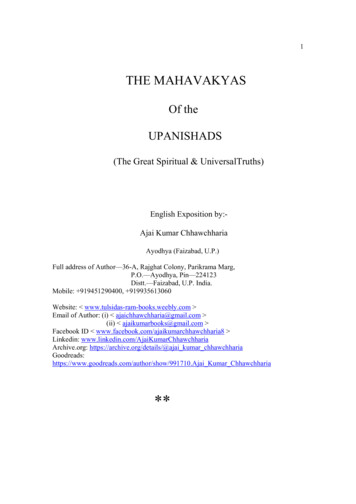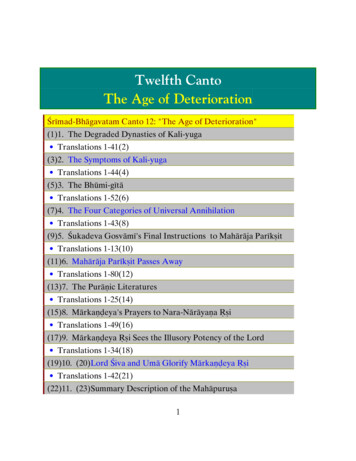
Transcription
Twelfth CantoThe Age of DeteriorationÇrémad-Bhägavatam Canto 12: "The Age of Deterioration"(1)1. The Degraded Dynasties of Kali-yuga Translations 1-41(2)(3)2. The Symptoms of Kali-yuga Translations 1-44(4)(5)3. The Bhümi-gétä Translations 1-52(6)(7)4. The Four Categories of Universal Annihilation Translations 1-43(8)(9)5. Çukadeva Gosvämé's Final Instructions to Mahäräja Parékñit Translations 1-13(10)(11)6. Mahäräja Parékñit Passes Away Translations 1-80(12)(13)7. The Puräëic Literatures Translations 1-25(14)(15)8. Märkaëòeya's Prayers to Nara-Näräyaëa Åñi Translations 1-49(16)(17)9. Märkaëòeya Åñi Sees the Illusory Potency of the Lord Translations 1-34(18)(19)10. (20)Lord Çiva and Umä Glorify Märkaëòeya Åñi Translations 1-42(21)(22)11. (23)Summary Description of the Mahäpuruña1
Translations 1-50(24)(25)12. (26)The Topics of Çrémad-Bhägavatam Summarized Translations 1-69(27)(28)13. (29)The Glories of Çrémad-Bhägavatam Translations 1-23(30)1. The Degraded Dynasties of Kali-yugaThe Twelfth Canto of Çrémad-Bhägavatam begins with Çréla ÇukadevaGosvämé predicting the kings of the earth who will appear in the future duringthe age of Kali. Then he gives a description of the numerous faults of the age,after which the presiding goddess of the earth sarcastically berates the foolishmembers of the kingly order who perpetually try to conquer her. NextÇukadeva Gosvämé explains the four varieties of material annihilation, andthen he gives his final advice to Mahäräja Parékñit. Thereafter King Parékñit isbitten by the snake-bird Takñaka and leaves this world. Süta Gosväméconcludes his narration of Çrémad-Bhägavatam to the sages at Naimiñäraëyaforest by enumerating the teachers of the various branches of the Vedas andPuräëas, relating the pious history of Märkaëòeya Åñi, glorifying the SupremeLord in His universal form and in His expansion as the sun-god, summarizingthe topics discussed in this literature, and offering final benedictions andprayers.The first chapter of this canto briefly describes the future kings of thedynasty of Magadha and how they become degraded because of the influenceof the age of Kali. There were twenty kings who ruled in the family of Püru, inthe dynasty of the sun-god, counting from Uparicara Vasu to Puraïjaya. After2
Puraïjaya, the lineage of this dynasty will become corrupted. FollowingPuraïjaya there will be five kings known as the Pradyotanas, who are thenfollowed by the Çiçunägas, the Mauryas, the Çuìgas, the Käëvas, thirty kings ofthe Andhra nation, seven Äbhéras, ten Gardabhés, sixteen Kaìkas, eightYavanas, fourteen Turuñkas, ten Guruëòas, eleven Maulas, five Kilakilämonarchs and thirteen Bählikas. After this, different regions will be ruled overat the same time by seven Andhra kings, seven Kauçalas, the kings of Vidüra,and the Niñadhas. Then the power of rulership in the countries of Magadhaand so forth will fall to kings who are no better than çüdras and mlecchas andare totally absorbed in irreligion.TEXTS 1-2 aIzAuk( ovaAcayaAe'ntya: paur"ÃayaAe naAmaBaivaSyaAe baAr"h"‰"Ta:tasyaAmaAtyastau zAunak(Aeh"tvaA svaAimanamaAtmajama,‘aâAetas aMÁaM r"AjaAnaMk(taAR yatpaAlak(: s auta:ivazAAKayaUpastatpau‡aAeBaivataA r"Ajak(stata:çré-çuka uväcayo 'ntyaù puraïjayo nämabhaviñyo bärahadrathaùtasyämätyas tu çunako3
hatvä sväminam ätma-jampradyota-saàjïaà räjänaàkartä yat-pälakaù sutaùviçäkhayüpas tat-putrobhavitä räjakas tataùSYNONYMSçré çukaù uväca—Çré Çukadeva Gosvämé said; yaù—who; antyaù—the puraïjayaù—Puraïjaya (Ripuïjaya); näma—named; bhaviñyaù—will live inthe future; bärahadrathaù—the descendant of Båhadratha; �—Çunaka;hatvä—killing;sväminam—his master; ätma-jam—his own son; pradyota-saàjïam—namedPradyota; räjänam—the king; kartä—will make; yat—whose; pälakaù—namedPälaka; sutaù—the son; viçäkhayüpaù—Viçäkhayüpa; tat-putraù—the son ofPälaka; bhavitä—will be; räjakaù—Räjaka; tataù—then (coming as the son ofViçäkhayüpa).TRANSLATIONÇukadeva Gosvämé said: The last king mentioned in our previousenumeration of the future rulers of the Mägadha dynasty was Puraïjaya, whowill take birth as the descendant of Båhadratha. Puraïjaya's minister Çunakawill assassinate the king and install his own son, Pradyota, on the throne. Theson of Pradyota will be Pälaka, his son will be Viçäkhayüpa, and his son will beRäjaka.PURPORTThe vicious political intrigue described here is symptomatic of the age ofKali. In the Ninth Canto of this work, Çukadeva Gosvämé describes how the4
great rulers of men descended from two royal dynasties, that of the sun andthat of the moon. The Ninth Canto's description of Lord Rämacandra, a mostfamous incarnation of God, occurs in this genealogical narration, and at theend of the Ninth Canto Çukadeva describes the forefathers of Lord Kåñëa andLord Balaräma. Finally, the appearance of Lord Kåñëa and that of LordBalaräma are mentioned within the context of the narration of the moondynasty.The Tenth Canto is devoted exclusively to a description of Lord Kåñëa'schildhood pastimes in Våndävana, His teenage activities in Mathurä and Hisadult activities in Dvärakä. The famous epic Mahäbhärata also describes theevents of this period, focusing upon the five Päëòava brothers and theiractivities in relation with Lord Kåñëa and other leading historical figures, suchas Bhéñma, Dhåtaräñöra, Droëäcärya and Vidura. Within the Mahäbhärata isBhagavad-gétä, in which Lord Kåñëa is declared to be the Absolute Truth, theSupreme Personality of Godhead. Çrémad-Bhägavatam, of which we arepresently translating the twelfth and final canto, is considered a moreadvanced literature than the Mahäbhärata because throughout the entire workLord Çré Kåñëa, the Absolute Truth and supreme source of all existence, isdirectly, centrally and irrefutably revealed. In fact, the First Canto of theBhägavatam describes how Çré Vyäsadeva composed this great work because hewas dissatisfied with his rather sporadic glorification of Lord Kåñëa in theMahäbhärata.Although Çrémad-Bhägavatam narrates the histories of many royal dynastiesand the lives of innumerable kings, not until the description of the presentage, the age of Kali, do we find a minister assassinating his own king andinstalling his son on the throne. This incident resembles Dhåtaräñöra's attemptto assassinate the Päëòavas and crown his son Duryodhana king. As theMahäbhärata describes, Lord Kåñëa thwarted this attempt, but with thedeparture of the Lord for the spiritual sky, the age of Kali became fullymanifested, ushering in political assassination within one's own house as astandard technique.5
TEXT 3naind"vaDaRnastatpau‡a:paÂa ‘aâAetanaA wmae@í"i‡aMzAAeÔar"zAtaMBaAeºyainta pa{iTavaI%M na{paA:nandivardhanas tat-putraùpaïca pradyotanä imeañöa-triàçottara-çataàbhokñyanti påthivéà ght;uttara—increased by; çatam—one hundred; bhokñyanti—they will enjoy;påthivém—the earth; nåpäù—these kings.TRANSLATIONThe son of Räjaka will be Nandivardhana, and thus in the Pradyotanadynasty there will be five kings, who will enjoy the earth for 138 years.TEXT 4izAzAunaAgAstataAe BaAvya:k(Ak(vaNARstau tats auta:6
ºaemaDamaAR tasya s auta:ºae‡aÁa: ºaemaDamaRja:çiçunägas tato bhävyaùkäkavarëas tu tat-sutaùkñemadharmä tasya sutaùkñetrajïaù kñemadharmä—Kñemadharmä; tasya—of Käkavarëa; sutaù—the son;kñetrajïaù—Kñetrajïa; kñemadharma-jaù—born to Kñemadharmä.TRANSLATIONNandivardhana will have a son named Çiçunäga, and his son will be knownas Käkavarëa. The son of Käkavarëa will be Kñemadharmä, and the son ofKñemadharmä will be Kñetrajïa.TEXT 5ivaiDas aAr": s autastasyaAjaAtazA‡auBaRivaSyaitad"BaRk(stats autaAe BaAvaId"BaRk(syaAjaya: sma{ta:vidhisäraù sutas tasyäjätaçatrur bhaviñyati7
darbhakas tat-suto bhävédarbhakasyäjayaù ka;tat-sutaù—the son of Ajätaçatru; bhävé—will take birth; darbhakasya—ofDarbhaka; ajayaù—Ajaya; småtaù—is remembered.TRANSLATIONThe son of Kñetrajïa will be Vidhisära, and his son will be Ajätaçatru.Ajätaçatru will have a son named Darbhaka, and his son will be Ajaya.TEXTS 6-8naind"vaDaRna @AjaeyaAemah"Anaind": s autastata:izAzAunaAgAA d"zAEvaEtaes aí"YauÔar"zAta‡ayama,s amaA BaAeºyainta pa{iTavaI%Mku(ç& aeï" k(laAE na{paA:mah"Anaind"s autaAe r"Ajana,zAU#‰"AgABaAeRà"vaAe balaImah"Apaápaita: k(iêna,8
nand": ºa‡aivanaAzAk{(ta,tataAe na{paA rdhana äjeyomahänandiù sutas tataùçiçunägä daçaivaitesañöy-uttara-çata-trayamsamä bhokñyanti påthivéàkuru-çreñöha kalau nåpäùmahänandi-suto räjançüdrä-garbhodbhavo balémahäpadma-patiù kaçcinnandaù kñatra-vinäça-kåttato nåpä bhaviñyantiçüdra-präyäs tv andi; sutaù—the son; tataù—then (followingNandivardhana); çiçunägäù—the Çiçunägas; daça—ten; eva—indeed;ete—these; sañöi—sixty; uttara—increased by; çata-trayam—three ;påthivém—theearth;kuruçreñöha—O best of the Kurus; kalau—in this age of Kali; nåpäù—thekings; mahänandi-sutaù—the son of Mahänandi; räjan—O King Parékñit;çüdrä-garbha—in the womb of a çüdra woman; udbhavaù—taking birth;balé—powerful; mahä-padma—of an army, or wealth, measured in the millions;patiù—the master; kaçcit—a certain; nandaù—Nanda; kñatra—of the hen;nåpäù—thekings;9
bhaviñyanti—will become; çüdra-präyäù—no better than çüdras; aya will father a second Nandivardhana, whose son will be Mahänandi. Obest of the Kurus, these ten kings of the Çiçunäga dynasty will rule the earthfor a total of 360 years during the age of Kali. My dear Parékñit, KingMahänandi will father a very powerful son in the womb of a çüdra woman. Hewill be known as Nanda and will be the master of millions of soldiers andfabulous wealth. He will wreak havoc among the kñatriyas, and from that timeonward virtually all kings will be irreligious çüdras.PURPORTHere is a description of how authentic political authority degenerated anddisintegrated throughout the world. There is a Supreme Godhead, and thereare saintly, powerful men who have taken the role of government leaders andrepresented that Godhead on earth. With the advent of the age of Kali,however, this transcendental system of government collapsed, andunauthorized, uncivilized men gradually took the reins of power.TEXT 9s a Wk(cC ‡aAM pa{iTavaIma,@nauéaiÎÿtazAAs ana:zAAis aSyaita mah"ApaáAeiã"taIya wva BaAgARva:sa eka-cchaträà påthivém10
anullaìghita-çäsanaùçäsiñyati mahäpadmodvitéya iva bhärgavaùSYNONYMSsaù—he (Nanda); eka-chaträm—under a single leadership; påthivém—theentire earth; anullaìghita—undefied; çäsanaù—his rulership; çäsiñyati—hewill have sovereignty over; mahäpadmaù—the lord of Mahäpadma; dvitéyaù—asecond; iva-as if; bhärgavaù—Paraçuräma.TRANSLATIONThat lord of Mahäpadma, King Nanda, will rule over the entire earth justlike a second Paraçuräma, and no one will challenge his authority.PURPORTIn the eighth verse of this chapter it was mentioned that King Nanda woulddestroy the remnants of the kñatriya order. Therefore he is here compared toLord Paraçuräma, who annihilated the kñatriya class twenty-one times in aprevious age.TEXT 10tasya caAí"AE BaivaSyaintas aumaAlya‘amauKaA: s autaA:ya wmaAM BaAeºyainta mah"I%Mr"AjaAnaê zAtaM s amaA:tasya cäñöau bhaviñyanti11
sumälya-pramukhäù sutäùya imäà bhokñyanti mahéàräjänaç ca çataà samäùSYNONYMStasya—of him (Nanda); ca—and; añöau—eight; bhaviñyanti—will take birth;sumälya-pramukhäù—headed by Sumälya; sutäù—sons; ye—who; imäm—this;bhokñyanti—will enjoy; mahém—the earth; räjänaù—kings; ca—and;çatam—one hundred; samäù—years.TRANSLATIONHe will have eight sons, headed by Sumälya, who will control the earth aspowerful kings for one hundred years.TEXT 11nava nand"Ainã"ja: k(iêta,‘apaªaAnauÜ"ir"SyaitataeSaAM @BaAvae jagAtaI%MmaAEyaAR BaAeºyainta vaE k(laAEnava nandän dvijaù kaçcitprapannän uddhariñyatiteñäà abhäve jagatéàmauryä bhokñyanti vai kalauSYNONYMSnava—nine; nandän—the Nandas (King Nanda and his eight sons);12
dvijaù—brähmaëa; kaçcit—a certain; prapannän—trusting; uddhariñyati—willuproot; teñäm—of them; abhäve—in the absence; jagatém—the earth;mauryäù—the Maurya dynasty; bhokñyanti—will rule over; vai—indeed;kalau—in this age, Kali-yuga.TRANSLATIONA certain brähmaëa [Cäëakya] will betray the trust of King Nanda and hiseight sons and will destroy their dynasty. In their absence the Mauryas will rulethe world as the age of Kali continues.PURPORTÇrédhara Svämé and Viçvanätha Cakravarté Öhäkura both confirm that thebrähmaëa mentioned here is Cäëakya, also known as Kauöilya or Vätsyäyana.The great historical narration Çrémad-Bhägavatam, which began with theevents prior to the cosmic manifestation, now reaches into the realm ofmodern recorded history. Modern historians recognize both the Mauryadynasty and Candragupta, the king mentioned in the following verse.TEXT 12s a Wva can‰"gAuæaM vaEiã"jaAe r"Ajyae'iBaSaeºyaitatats autaAe vaAir"s aAr"stautataêAzAAek(vaDaRna:sa eva candraguptaà vaidvijo räjye 'bhiñekñyatitat-suto värisäras tu13
tataç cäçokavardhanaùSYNONYMSsaù—he (Cäëakya); eva—indeed; candraguptam—Prince Candragupta;vai—indeed; dvijaù—the brähmaëa; räjye—in the role of ardhanaù—Açokavardhana.TRANSLATIONThis brähmaëa will enthrone Candragupta, whose son will be namedVärisära. The son of Värisära will be Açokavardhana.TEXT 13s auyazAA BaivataA tasyas aËÿta: s auyazA:s auta:zAAilazAUk(statastasyas aAemazAmaAR BaivaSyaitazAtaDanvaA tatastasyaBaivataA taä,"ba{h"‰"Ta:suyaçä bhavitä tasyasaìgataù suyaçaù-sutaùçäliçükas tatas tasyasomaçarmä bhaviñyatiçatadhanvä tatas tasyabhavitä tad-båhadrathaù14
SYNONYMSsuyaçäù—Suyaçä; bhavitä—will be born; tasya—of him (Açokavardhana);saìgataù—Saìgata; suyaçaù-sutaù—the son of Suyaçä; aviñyati—will be; çatadhanvä—Çatadhanvä; tataù—next; tasya—of Açokavardhana will be followed by Suyaçä, whose son will be Saìgata. Hisson will be Çäliçüka, Çäliçüka's son will be Somaçarmä, and Somaçarmä's sonwill be Çatadhanvä. His son will be known as Brhadratha.TEXT 14maAEyaAR etae d"zA na{paA:s aæai‡aMzAcC taAeÔar"ma,s amaA BaAeºyainta pa{iTavaI%Mk(laAE ku(ç&ku(laAeã"h"mauryä hy ete daça nåpäùsapta-triàçac-chatottaramsamä bhokñyanti påthivéàkalau kuru-kulodvahaSYNONYMSmauryäù—the Mauryas; hi—indeed; ete—these; daça—ten; nåpäù—kings;15
sapta-triàçat—thirty-seven; çata—one hundred; uttaram—more than;samäù—years; bhokñyanti—they will rule; påthivém—the earth; kalau—inKali-yuga; kuru-kula—of the Kuru dynasty; udvaha—O most eminent hero.TRANSLATIONO best of the Kurus, these ten Maurya kings will rule the earth for 137 yearsof the Kali-yuga.PURPORTAlthough nine kings are mentioned by name, Daçaratha appeared afterSujyeñöha, before the rule of Saìgata, and thus there are ten Maurya kings.TEXTS 15-17@i aima‡astatastasmaAta,s aujyaeï"Ae BaivataA tata:vas auima‡aAe Ba‰"k(êpauiland"Ae BaivataA s auta:tataAe GaAeSa: s autastasmaAä,"va†aima‡aAe BaivaSyaitatataAe BaAgAvatastasmaAä,"de"vaBaUita: ku(è&ã"h"zAuËÿA d"zAEtae BaAeºyaintaBaUimaM vaSaRzAtaAiDak(ma,16
tata: k(ANvaAinayaM BaUimar,"yaAsyatyalpagAuNAAªa{paagnimitras tatas tasmätsujyeñöho bhavitä tataùvasumitro bhadrakaç capulindo bhavitä sutaùtato ghoñaù sutas tasmädvajramitro bhaviñyatitato bhägavatas tasmäddevabhütiù kurüdvahaçuìgä daçaite bhokñyantibhümià varña-çatädhikamtataù käëvän iyaà bhümiryäsyaty alpa-guëän nåpaSYNONYMSagnimitraù—Agnimitra; tataù—from Puñpamitra, the general who will murderBåhadratha; tasmät—from him (Agnimitra); Bhadraka; ca—and; pulindaù—Pulinda; bhavitä—will be;sutaù—the son; tataù—from him (Pulinda); ghoñaù—Ghoña; sutaù—the son;tasmät—from him; vajramitraù—Vajramitra; bhaviñyati—will be; tataù—fromhim; bhägavataù—Bhägavata; tasmät—from him; devabhüti—Devabhüti;kuru-udvaha—O most eminent of the Kurus; çuìgäù—the Çuìgas; daça—ten;ete—these; bhokñyanti—will enjoy; bhümim—the earth; varña—years;çata—one hundred; adhikam—more than; tataù—then; käëvän—the Käëvadynasty; iyam—this; bhümiù—the earth; yäsyati—will come under the domain;alpa-guëän—of few good qualities; nåpa—O King Parékñit.17
TRANSLATIONMy dear King Parékñit, Agnimitra will follow as king, and then Sujyeñöha.Sujyeñöha will be followed by Vasumitra, Bhadraka, and the son of Bhadraka,Pulinda. Then the son of Pulinda, named Ghoña, will rule, followed byVajramitra, Bhägavata and Devabhüti. In this way, O most eminent of theKuru heroes, ten Çuìga kings will rule over the earth for more than onehundred years. Then the earth will come under the subjugation of the kings ofthe Käëva dynasty, who will manifest very few good qualities.PURPORTAccording to Çréla Çrédhara Svämé, the Çuìga dynasty began when GeneralPuñpamitra killed his king, Båhadratha, and assumed power. After Puñpamitracame Agnimitra and the rest of the Çuìga dynasty, which lasted for 112 years.TEXT 18zAuËMÿ h"tvaA de"vaBaUitaMk(ANvaAe'maAtyastau k(Aimanama,svayaM k(ir"Syatae r"AjyaMvas aude"vaAe mah"Amaita:çuìgaà hatvä devabhütiàkäëvo 'mätyas tu käminamsvayaà kariñyate räjyaàvasudevo mahä-matiùSYNONYMS18
�tim—Devabhüti;käëvaù—the member of the Käëva family; amätyaù—his minister; tu—but;käminam—lusty; svayam—himself; kariñyate—will execute; räjyam—therulership; vasudevaù—named Vasudeva; mahä-matiù—very intelligent.TRANSLATIONVasudeva, an intelligent minister coming from the Käëva family, will kill thelast of the Çuìga kings, a lusty debauchee named Devabhüti, and assumerulership himself.PURPORTApparently, because King Devabhüti was lusty after the wives of other men,his minister killed him, assuming leadership and thus beginning the Käëvadynasty.TEXT 19tasya pau‡astau BaUima‡as a,tasya naAr"AyaNA: s auta:k(ANvaAyanaA wmae BaUimaMcatvaAir MzA»a paÂa cazAtaAina ‡aIiNA BaAeºyaintavaSaARNAAM ca k(laAE yaugAetasya putras tu bhümitrastasya näräyaëaù sutaùkäëväyanä ime bhümiàcatväriàçac ca païca ca19
çatäni tréëi bhokñyantivarñäëäà ca kalau yugeSYNONYMStasya—of him (Vasudeva); putraù—the son; tu—and; bhümitraù—Bhümitra;tasya—his; näräyaëaù—Näräyaëa; sutaù—the son; käëva-ayanäù—kings ofthe Käëva dynasty; ime—these; bhümim—the earth; ti—they will rule; varñäëäm—years; ca—and; kalau yuge—in theKali-yuga.TRANSLATIONThe son of Vasudeva will be Bhümitra, and his son will be Näräyaëa. Thesekings of the Käëva dynasty will rule the earth for 345 more years of theKali-yuga.TEXT 20h"tvaA k(ANvaM s auzAmaARNAMtaà{"tyaAe va{SalaAe balaIgAAM BaAeºyatyan‹ajaAtaIya:k(iÂatk(Alamas aÔama:hatvä käëvaà suçarmäëaàtad-bhåtyo våñalo balégäà bhokñyaty andhra-jätéyaùkaïcit kälam asattamaù20
SYNONYMShatvä—killing; käëvam—the Käëva king; suçarmäëam—named Suçarmä;tat-bhåtyaù—his own servant; våñalaù—a low-class çüdra; balé—named Balé;gäm—the earth; bhokñyati—will rule; andhra-jätéyaù—of the Andhra race;kaïcit—for some; kälam—time; asattamaù—most degraded.TRANSLATIONThe last of the Käëvas, Suçarmä, will be murdered by his own servant, Baléa low-class çüdra of the Andhra race. This most degraded Mahäräja Balé willhave control over the earth for some time.PURPORTHere is a further description of how uncultured men infiltrated governmentadministration. The so-called king named Balé is described as asattama, a mostimpious, uncultured man.TEXTS 21-26k{(SNAnaAmaATa taä,"”aAtaABaivataA pa{iTavaIpaita: aIzAAntak(NARstatpau‡a:paAENARmaAs astau tats auta:lambaAed"r"stau tatpau‡as a,tasmaAi»aibalak(Ae na{pa:maeGasvaAitaiêibalak(Aä,"21
@q%maAnastau tasya ca@inaí"k(maAR h"Alaeyas a,talak(stasya caAtmaja:paur"ISaBaIç&statpau‡as a,tataAe r"AjaA s aunand"na:cak(Aer"Ae bah"vaAe ya‡aizAvasvaAitar"ir"nd"ma:tasyaAipa gAAemataI pau‡a:paur"ImaAna, BaivataA tata:maed"izAr"A: izAvas k(nd"AeyaÁa aIstats autastata:ivajayastats autaAe BaAvyazA,can‰"ivaÁa: s alaAemaiDa:Wtae i‡aMzAªa{patayazA,catvaAyaRbd"zAtaAina caSaq%.paÂaAzA»a pa{iTavaI%MBaAeºyainta ku(ç&nand"nakåñëa-nämätha tad-bhrätäbhavitä påthivé-patiùçré-çäntakarëas tat-putraùpaurëamäsas tu tat-sutaù22
lambodaras tu tat-putrastasmäc cibilako nåpaùmeghasvätiç cibilakädaöamänas tu tasya caaniñöakarmä häleyastalakas tasya cätma-jaùpuréñabhérus tat-putrastato räjä sunandanaùcakoro bahavo yatraçivasvätir arin-damaùtasyäpi gomaté putraùpurémän bhavitä tataùmedaçiräù çivaskandoyajïaçrés tat-sutas tataùvijayas tat-suto bhävyaçcandravijïaù sa-lomadhiùete triàçan nåpatayaçcatväry abda-çatäni cañaö-païcäçac ca påthivéàbhokñyanti kuru-nandanaSYNONYMSkåñëa-näma—named Kåñëa; atha—then; tat—of him (Balé); bhrätä—thebrother; bhavitä—will become; påthivé-patiù—the master of the earth;çré-çäntakarëaù—Çré Çäntakarëa; tat—of Kåñëa; putraù—the aù—hisson;lambodaraù—Lambodara; tu—and; tat-putraù—his son; tasmät—from king;meghasvätiù—Meghasväti; cibilakät—from Cibilaka; aöamänaù—Aöamäna;23
tu—and; tasya—of him (Meghasväti); ca—and; a; talakaù—Talaka; tasya—of him (Häleya); ca—and;ätma-jaù—the son; puréñabhéruù—Puréñabhéru; tat—of Talaka; väti; arimdamaù—the subduer of enemies; tasya—of purémän—Purémän;bhavitä—will be; tataù—from him (Gomaté); nda; yajïaçréù—Yajïaçré; tat—of Çivaskanda; sutaù—theson; tataù—then; vijayaù—Vijaya; tat-sutaù—his son; bhävyaù—will be;candravijïaù—Candravijïa; sa-lomadhiù—along with Lomadhi; ete—these;triàçat—thirty; nå-patayaù—kings; catväri—four; �yanti—will rule; kuru-nandana—O favorite son of the Kurus.TRANSLATIONThe brother of Balé, named Kåñëa, will become the next ruler of the earth.His son will be Çäntakarëa, and his son will be Paurëamäsa. The son ofPaurëamäsa will be Lambodara, who will father Mahäräja Cibilaka. FromCibilaka will come Meghasväti, whose son will be Aöamäna. The son ofAöamäna will be Aniñöakarmä. His son will be Häleya, and his son will beTalaka. The son of Talaka will be Puréñabhéru, and following him Sunandanawill become king. Sunandana will be followed by Cakora and the eight Bahus,among whom Çivasväti will be a great subduer of enemies. The son of Çivasvätiwill be Gomaté. His son will be Purémän, whose son will be Medaçirä. His sonwill be Çivaskanda, and his son will be Yajïaçré. The son of Yajïaçré will beVijaya, who will have two sons, Candravijïa and Lomadhi. These thirty kingswill enjoy sovereignty over the earth for a total of 456 years, O favorite son ofthe Kurus.24
TEXT 27s aæaABaIr"A @AvaBa{tyaAd"zA gAdR"iBanaAe na{paA:k(ÆÿA: SaAex"zA BaUpaAlaABaivaSyantyaitalaAelaupaA:saptäbhérä ävabhåtyädaça gardabhino nåpäùkaìkäù ñoòaça bhü-päläbhaviñyanty ati-lolupäùSYNONYMSsapta—seven; äbhéräù—Äbhéras; ävabhåtyäù—of the city of teen; bhü-päläù—rulers of the earth; bhaviñyanti—will be;ati-lolupäù—very greedy.TRANSLATIONThen will follow seven kings of the Äbhéra race from the ciq of Avabhåti,and then ten Gardabhés. After them, sixteen kings of the Kaìkas will rule andwill be known for their excessive greed.TEXT 28tataAe'í"AE yavanaA BaAvyaAzA,cataudR"zA tauç&Sk(k(A:BaUyaAe d"zA gAuç&Nx"Aê25
maAElaA Wk(Ad"zAEva tautato 'ñöau yavanä bhävyäçcaturdaça turuñkakäùbhüyo daça guruëòäç camaulä ekädaçaiva mauläù—Maulas;ekädaça—eleven; eva—indeed; tu—and.TRANSLATIONEight Yavanas will then take power, followed by fourteen Turuñkas, tenGuruëòas and eleven kings of the Maula dynasty.TEXTS 29-31Wtae BaAeºyainta pa{iTavaI%Md"zA vaSaRzAtaAina canavaAiDak(AM ca navaitaMmaAElaA Wk(Ad"zA iºaitama,BaAeºyantyabd"zAtaAnyaËÿ‡aIiNA taE: s aMisTatae tata:ik(laik(laAyaAM na{patayaAe26
BaUtanand"Ae'Ta vaiËÿir":izAzAunaind"ê taä,"”aAtaAyazAAenaind": ‘avaIr"k(:wtyaetae vaE vaSaRzAtaMBaivaSyantyaiDak(Aina Saq%.ete bhokñyanti påthivéàdaça varña-çatäni canavädhikäà ca navatiàmaulä ekädaça kñitimbhokñyanty abda-çatäny aìgatréëi taiù saàsthite tataùkilakiläyäà nåpatayobhütanando 'tha vaìgiriùçiçunandiç ca tad-bhrätäyaçonandiù pravérakaùity ete vai varña-çataàbhaviñyanty adhikäni ñaöSYNONYMSete—these; bhokñyanti—will rule; påthivém—the earth; daça—ten;varña-çatäni—centuries; ca—and; nava-adhikäm—plus nine; ca—and;navatim—ninety; mauläù—the Maulas; ekädaça—eleven; kñitim—the world;bhokñyanti—will rule; abda-çatäni—centuries; aìga—my dear Parékñit;tréëi—three; taiù—they; saàsthite—when they are all dead; ha—andthen;vaìgiriù—Vaìgiri;27
ätä—brother;yaçonandiù—Yaçonandi; pravérakaù—Pravéraka; iti—thus; ete—these;vai—indeed; varña-çatam—one hundred years; bhaviñyanti—will be;adhikäni—plus; ñaö—six.TRANSLATIONThese Äbhéras, Gardabhés and Kaìkas will enjoy the earth for 1,099 years,and the Maulas will rule for 300 years. When all of them have died off therewill appear in the city of Kilakilä a dynasty of kings consisting of Bhütananda,Vaìgiri, Çiçunandi, Çiçunandi's brother Yaçonandi, and Pravéraka. These kingsof Kilakilä will hold sway for a total of 106 years.TEXTS 32-33taeSaAM ‡ayaAed"zA s autaABaivataAr"ê baAiø"k(A:pauSpaima‡aAe'Ta r"AjanyaAeäu"imaR‡aAe'sya taTaEva caWk(k(AlaA wmae BaUpaA:s aæaAn‹aA: s aæa k(AEzAlaA:ivaäU"r"patayaAe BaAvyaAinaSaDaAstata Wva ih"teñäà trayodaça sutäbhavitäraç ca bählikäùpuñpamitro 'tha räjanyodurmitro 'sya tathaiva ca28
eka-kälä ime bhü-päùsaptändhräù sapta kauçaläùvidüra-patayo bhävyäniñadhäs tata eva hiSYNONYMSteñäm—of them (Bhütananda and the other kings of the Kilakilä itäraù—willbe;ca—and;bählikäù—called the Bählikas; puñpamitraù—Puñpamitra; atha—then;räjanyaù—the king; durmitraù—Durmitra; asya—his (son); tathä—also;eva—indeed; ca—and; eka-käläù—ruling at the same time; äù—Andhras;sapta—seven;kauçaläù—kings of Kauçala-deça; vidüra-patayaù—rulers of Vidüra;bhävyäù—will be; niñadhäù—Niñadhas; tataù—then (after the Bählikas); evahi—indeed.TRANSLATIONThe Kilakiläs will be followed by their thirteen sons, the Bählikas, and afterthem King Puñpamitra, his son Durmitra, seven Andhras, seven Kauçalas andalso kings of the Vidüra and Niñadha provinces will separately rule in differentparts of the world.TEXT 34maAgADaAnaAM tau BaivataAivaìs PU(ijaR: paur"Ãaya:k(ir"Syatyapar"Ae vaNAARna,29
pauiland"yaäu"ma‰"k(Ana,mägadhänäà tu bhavitäviçvasphürjiù puraïjayaùkariñyaty aparo m—of the Magadha province; tu—and; bhavitä—there will be;viçvasphürjiù—Viçvasphürji; puraïjayaù—King Puraïjaya; kariñyati—he willmake; aparaù—being the replica of; varëän—all the civilized classes of men;pulinda-yadu-madrakän—into outcastes such as the Pulindas, Yadus andMadrakas.TRANSLATIONThere will then appear a king of the Mägadhas named Viçvasphürji, who willbe like another Puraïjaya. He will turn all the civilized classes into low-class,uncivilized men in the same category as the Pulindas, Yadus and Madrakas.TEXT 35‘ajaAêA“aöBaUiyaï"A:sTaApaiyaSyaita äu"maRita:vaIyaRvaAna, ºa‡amauts aAâpaávatyaAM s a vaE pauir"@naugAËÿmaA‘ayaAgAM30
gAuæaAM BaAeºyaita maeid"naIma,prajäç cäbrahma-bhüyiñöhäùsthäpayiñyati durmatiùvéryavän kñatram utsädyapadmavatyäà sa vai purianu-gaìgam ä-prayägaàguptäà bhokñyati tly; sthäpayiñyati—he will make; durmatiù—theunintelligent (Viçvasphürji); vérya-van—powerful; kñatram—the kñatriya class;utsädya—destroying; padmavatyäm—in Padmavaté; saù—he; vai—indeed;puri—in the city; anu-gaìgam—from Gaìgädvärä (Hardwar); ä-prayägam—toPrayäga; guptäm—protected; bhokñyati—he will rule; mediném—the earth.TRANSLATIONFoolish King Viçvasphürji will maintain all the citizens in ungodliness andwill use his power to completely disrupt the kñatriya order. From his capital ofPadmavaté he will rule that part of the earth extending from the source of theGaìgä to Prayäga.TEXT 36s aAEr"Aí)"AvantyaABaIr"AêzAUr"A @bauRd"maAlavaA: aAtyaA iã"jaA BaivaSyainta31
zAU#‰"‘aAyaA janaAiDapaA:sauräñörävanty-äbhéräç caçürä arbuda-mälaväùvrätyä dvijä bhaviñyantiçüdra-präyä janädhipäùSYNONYMSçauräñöra—residing in Çauräñöra; avanté—in Avanté; äbhéräù—and in Äbhéra;ca—and; çüräù—residing in the Çüra province; arbuda-mälaväù—residing inArbuda and Mälava; vrätyäù—deviated from all purificatory rituals;dvijäù—the brähmaëas; bhaviñyanti—will become; çüdra-präyäù—no betterthan çüdras; jana-adhipäù—the kings.TRANSLATIONAt that time the brähmaëas of such provinces as Çauräñöra, Avanté, Äbhéra,Çüra, Arbuda and Mälava will forget all their regulative principles, and themembers of the royal order in these places will become no better than çüdras.TEXT 37is anDaAestaqM% can‰"BaAgAAMk(AEntaI%M k(AzmaIr"maNx"lama,BaAeºyainta zAU#‰"A aAtyaA
5 great rulers of men descended from two royal dynasties, that of the sun and that of the moon. The Ninth Canto's description of Lord Rämacandra, a most


